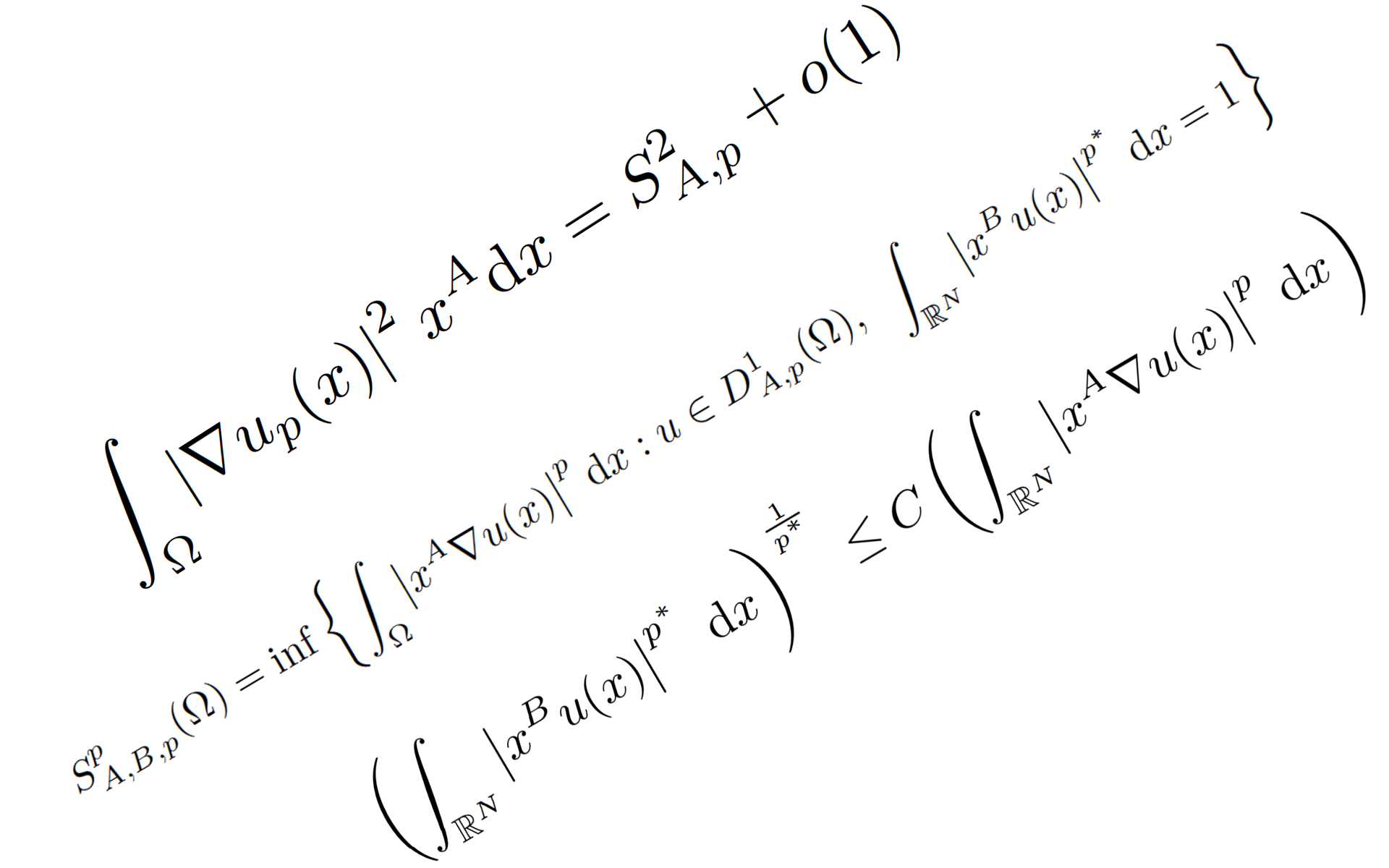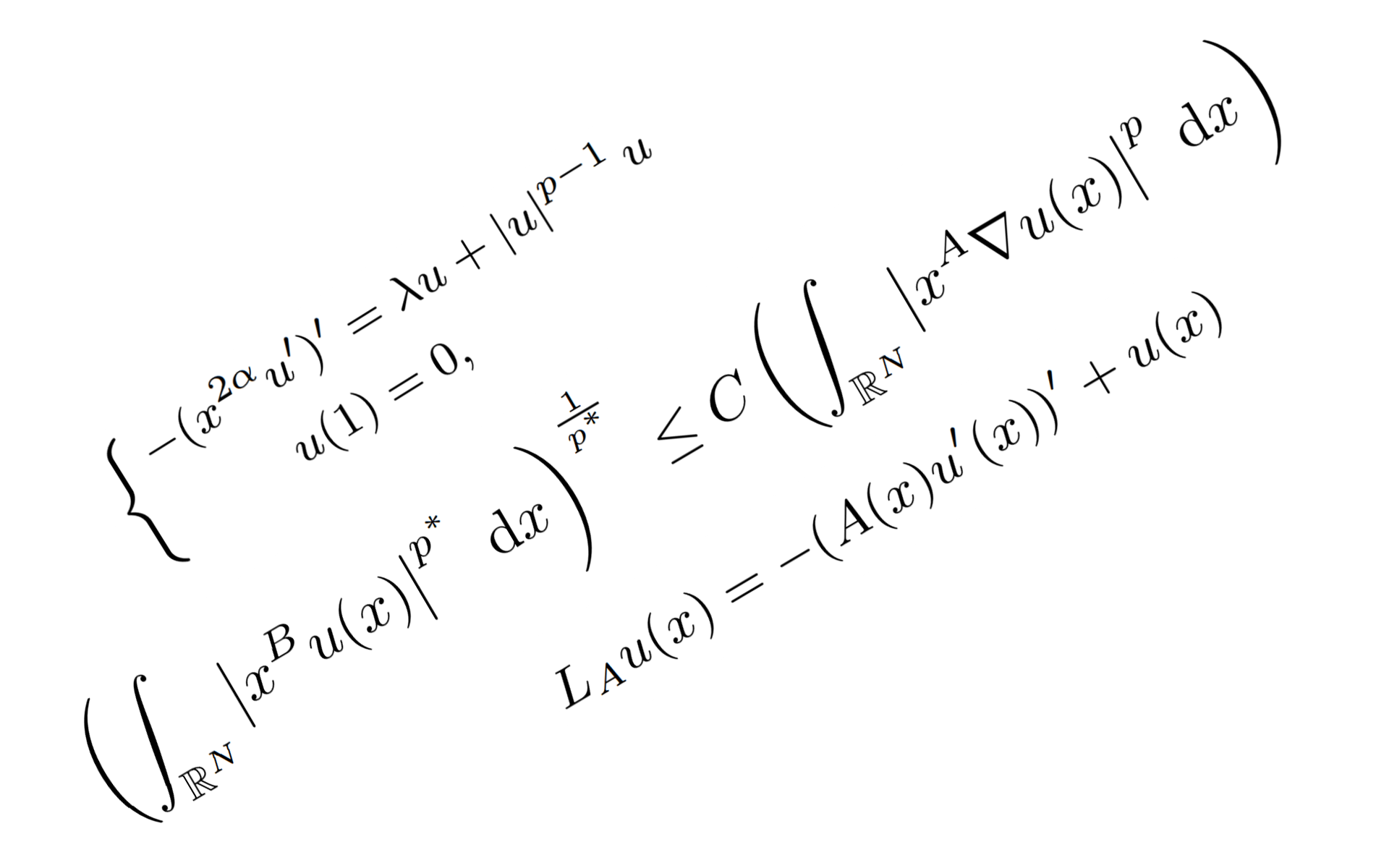Assistant Professor
Universidad de Talca

I am an Assistant Professor at the Instituto de Matemáticas from the Universidad de Talca in Chile. I earned my Ph.D. in Mathematics from Rutgers University in 2012, where I worked under the supervision of Haim Brezis on singular Sturm-Liouville equations. Prior to that, I obtained my Mathematical Engineering degree from Universidad de Chile, working with Juan Dávila on singular perturbation problems.
My current research focuses on the study of degenerate and singular elliptic partial differential equations, particularly their connections to Hardy-Sobolev inequalities and weighted Sobolev spaces. I am interested in understanding the existence and properties of extremals for critical Hardy-Sobolev inequalities, as well as some other properties of singular differential operators.
I teach both undergraduate and graduate courses in analysis and partial differential equations. You can find more details about my research projects and publications by exploring the Research and Publications sections from the side panel.
Universidad de Talca
Universidad de Talca
Universidad de Talca
Ph.D. in Mathematics
Rutgers University
Mathematical Engineering
Universidad de Chile
Bachelor of Sciences in Engineering Mathematics
Universidad de Chile






In the past years I have been studying singular (degenerate) second order elliptic operators such as the singular Sturm-Liouville operator \(L_\alpha u(t):=-(t^{2\alpha}u'(t))'\) where \(\alpha>0\), or the degenerate elliptic operator \(\mathcal L_\alpha u(x):=-\mathrm{div}(x^A\nabla u(x))\) where \(A\in\mathbb R^N\) is a given vector and \(x^A=|x_1|^{a_1}\cdot\ldots |x_N|^{a_N}\). In such studies the construction of suitable weighted Sobolev spaces and the study of their properties were quite significant and opened a very interesting line of research. In particular, it was established the validity of the following Hardy-Sobolev inequalities \begin{equation}\label{hs-ineq} \left(\int_{\mathbb R^N} \left|x^B u(x)\right|^{p^*} dx\right)^{\frac 1{p^*}}\leq C\left(\int_{\mathbb R^N}\left|x^A\nabla u(x)\right|^p dx\right)^{\frac1p} \end{equation} for suitable \(p\geq 1\), \(A,B\in\mathbb R^N\) and \[ p^*=\frac{Np}{N-p(1+b-a)}, \] where \(a=a_1+\ldots+a_N\) and \(b=b_1+\ldots+b_N\). This work leads to several interesting open problems, some of which are the purpose of this research project.
One of the natural topics of interest that arise when one has proved such an inequality is the existence of extremals and the value of the best possible constant \(C>0\). Namely, for a given open set \(\Omega\subseteq\mathbb R^N\), we would like to investigate the existence of a function \(u_{A,B,p}=u_p\) and the value of the constant \(S_{A,B,p}>0\) such that \[ S_{A,B,p}^p(\Omega)=\inf\left\{\int_{\Omega}\left|x^A\nabla u(x)\right|^p dx:~u\in D^1_{A,p}(\Omega),~\int_{\mathbb R^N} \left|x^B u(x)\right|^{p^*} dx=1\right\}=\int_{\Omega}\left|x^A\nabla u_p(x)\right|^p dx, \] here \(D^1_{A,p}(\Omega)\) denotes the completion of \(C^\infty_0(\Omega)\) under the norm \(\Vert u\Vert^p=\int_{\Omega}\left|x^A\nabla u(x)\right|^p dx\). The main difficulty in this problem arises when one notices that \(p^*\) is critical from the viewpoint of the embedding of the weighted Sobolev space into the weighted \(L^q\) space. More precisely, if \(\Omega\) is bounded and contains the origin then the space \(D^1_{A,p}(\Omega)\) is embedded into the respective weighted space \(L^q(\Omega, x^{Bp^*})\) for \(1\leq q\leq p^*\), but the embedding is compact if and only if \(q< {p^*}\). This lack of compactness prevents us from using the classical minimization strategy to obtain extremals for \(S_{A,B,p}(\Omega)\), thus making this a problem worth addressing.
The other problem we plan to attack in this research project concerns the the asymptotic behavior of minimizer sequences for the problem \[ S^p_{A,p}=\inf\left\{\int_{\Omega}\left|\nabla u(x)\right|^2x^A dx:u\in D^1_{A,2}(\Omega),~\int_{\Omega} \left|u(x)\right|^{p}x^A dx=1\right\} \] where \(p\nearrow 2^*\). More precisely, since the embedding from \(D^1_{A,2}(\Omega)\) to \(L^p(\Omega,x^Adx)\) is compact for \(q<{2^*}\) we can assert the existence of a function \(u_{A,p}=u_p\in D^1_{A,2}(\Omega)\) such that \(\int_{\Omega} \left|u(x)\right|^{p}x^A dx=1\) and \[ \int_{\Omega}\left|\nabla u_p(x)\right|^2x^A dx=S^2_{A,p}+o(1) \] as \(p\nearrow 2^*\). The idea is to obtain a generalization of the known results about the classical Sobolev inequality (\(A=0\)). For example, we would like to know if \(u_p\) develops blow up points as \(p\nearrow 2^*\), and if this is the case, we would also like to discover the location of such blow up points and the respective limiting profile of suitable normalized minimizers.

During the course of my Ph.D. studies, I developed a theory about the singular second order Sturm-Liouville operator \(L_\alpha u(x)=-(x^{2\alpha}u'(t))'\) on the interval \((0,1)\), where \(\alpha>0\) is a real parameter. One of the main reasons I studied this operator is that it serves as a toy model to more general degenerate elliptic operators, and results obtained in this simpler setup might shed some light into the study of more general cases.
In joints works with H. Wang we used tools from functional analysis to prove existence and regularity, uniqueness of solutions, as-well as spectral properties of the equation \(L_\alpha u+u=f\). The core idea behind this study was to look for solutions in appropriate weighted Sobolev spaces (which had to be constructed for the occasion). Later, I studied the semi-linear eigenvalue problem \(L_\alpha u=\lambda u+|u|^{p-1}u\), where \(\lambda\) and \(p>1\) are real parameters. In those works, I performed a bifurcation analysis for \(L_\alpha\), determining the relationship between the parameters \(\alpha,~\lambda\) and \(p\) and the existence/non-existence of a branch of positive solutions emanating form the first eigenvalue \(\lambda_1\) of \(L_\alpha\).
The main goal of this work will be to continue the research about the operator \(L_\alpha\) by answering some of the open problems that arose in the works cited before.
In terms of the semi-linear eigenvalue problem \(L_\alpha u=\lambda u+|u|^{p-1}u\) the open problems I plan to attack can be divided into two cases with respect to the parameter \(\alpha\): \(0 < \alpha < 1\) and \(\alpha\geq 1\). In the case where \(0 < \alpha < 1\) there are a few open questions, specially when the parameter \(p\) is large: in a previous article we showed that positive solutions only exist in a range \(\hat\lambda < \lambda < \lambda_1\) for some \(\hat\lambda>0\), however we still do not have a precise description of the optimal \(\hat\lambda\), and how the branch of positive solutions behave near that \(\hat\lambda\). When \(\alpha\geq 1\), we know that all solutions satisfying \(u(1)=0\) must have infinite sing changes in the interval \((0,1)\), however, we would like to know how fast the sing changes occur as we approach \(x=0\); also, the existence of bounded solutions in this case remain an open question.
On the other hand, the operator \(L_\alpha u(x)=-(x^{2\alpha}u'(x))'\) can be generalized into two different directions:
Here you can find some teaching material (lecture notes, exercises, past exams) from the courses I have taught. Most of the material is in spanish.